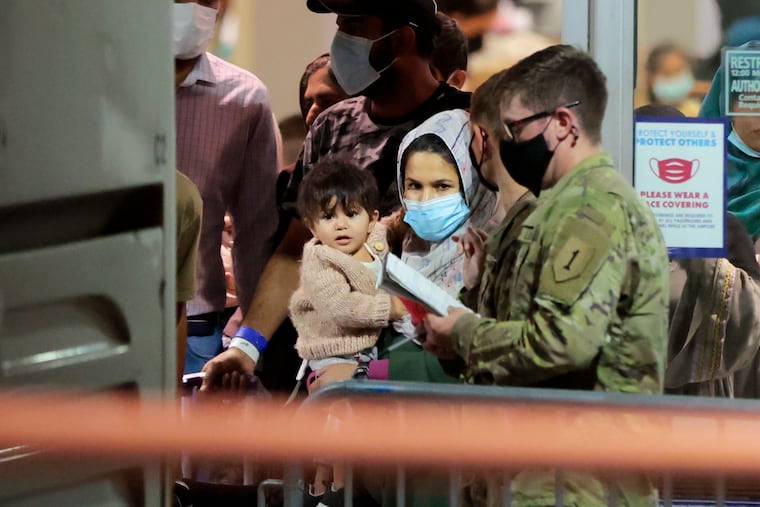How the Afghan Adjustment Act would help U.S. allies who were evacuated to Philadelphia and elsewhere.
We answer questions on legislation that could change the lives of some 76,000 Afghan allies who were flown to the United States

Days before the one-year anniversary of the fall of Kabul — which commenced the giant air evacuation of wartime Afghan allies to the United States — the House and Senate introduced the Afghan Adjustment Act on Tuesday. The law has been sought by Afghans, their supporters, clergy and immigration organizations who say it’s crucial to securing the futures of those who fought side-by-side with American troops.
What exactly is the Afghan Adjustment Act, and what would it do?
The law would directly affect the lives of 76,000 Afghans who were evacuated to the United States, most of whom have now been resettled in communities across the country. The big impact: It would provide a pathway to permanent residency and to citizenship for allies who currently have none.
What do you mean ‘citizenship’? Didn’t the Afghans become citizens when they got here?
No. Almost all were admitted to the U.S. under what is called humanitarian parole. That’s a permission to enter the country, but it’s not an immigration status. What’s more, it provides no automatic means of attaining permanent residency or citizenship. That’s left the Afghans who came to this country living under a cloud of uncertainty. Some have applied for asylum, a process that promises to be long, uncertain, and expensive.
Didn’t Philadelphia play a major role in the Afghan evacuation?
It sure did. In many ways, Philadelphia stood at the center of what was the largest evacuation since the Vietnam War. Philadelphia International Airport served as the nation’s main arrival point, welcoming more than 30,000 Afghans, and some 11,000 newcomers lived for months in South Jersey, on the grounds of Joint Base McGuire-Dix-Lakehurst, while awaiting resettlement.
What would be the timeline for citizenship for Afghans?
It varies. But many would have to be physically present in the United States for two years before applying for legal permanent residency. Once their green card is approved, the timing would become the same as that for legal refugees, who can apply for citizenship after five years.
How big is Philadelphia’s Afghan community?
More than twice as big as it was before the evacuation. In 2020, Philadelphia was home to about 700 Afghans. About 800 came here amid the American military withdrawal, raising the total to roughly 1,500 now.
Will Afghans applying for citizenship go through security screening?
Yes. Lots. Under the act, Afghans would undergo the same rigorous vetting that’s applied to those seeking haven through the U.S. Refugee Admissions Program. The Afghans evacuated to the United States already underwent screening during Operation Allies Welcome. Now, the Department of Homeland Security would run additional background checks, complete a comprehensive biometrics analysis, again, and conduct additional in-person screening interviews for each applicant.
Are Afghans applying for citizenship getting special treatment through this law?
No. The U.S. has passed similar adjustment acts for those forced to flee other wars and conflicts, including Cubans caught in Castro’s rise to power, Vietnamese and Cambodians after the fall of Saigon, and Iraqi Kurds during the rule of Saddam Hussein.
Will the Afghan Adjustment Act act pass?
Nothing is certain in Congress, but the act was introduced in both houses of Congress with bipartisan support.
What if the Afghan Adjustment Act fails?
That would be a problem. It would likely mean tens of thousands of new asylum claims would be forced into an immigration system that’s already choking on applications. Many evacuees lack the documents they would need to prove asylum cases, since they destroyed official papers that showed their American ties as they tried to avoid capture by the Taliban.
What are people saying about the Afghan Adjustment Act ?
“We hope this legislation can create a clear path forward,” said Gretchen Shanfeld, senior director of program operations at Nationalities Service Center, the lead resettlement agency for Afghans in Philadelphia. Right now Afghan families are “facing an incredibly slow and protracted asylum process.”
How can I learn more about the Afghan Adjustment Act?
RSVP for the National Immigration Forum’s Facebook Live presentation at 3 p.m. Monday. Experts from Lutheran Immigration and Refugee Service, World Relief, and the American Immigration Council will talk about the bill and its potential impacts.
The Philadelphia Inquirer is one of more than 20 news organizations producing Broke in Philly, a collaborative reporting project on solutions to poverty and the city’s push toward economic justice. See all of our reporting at brokeinphilly.org.